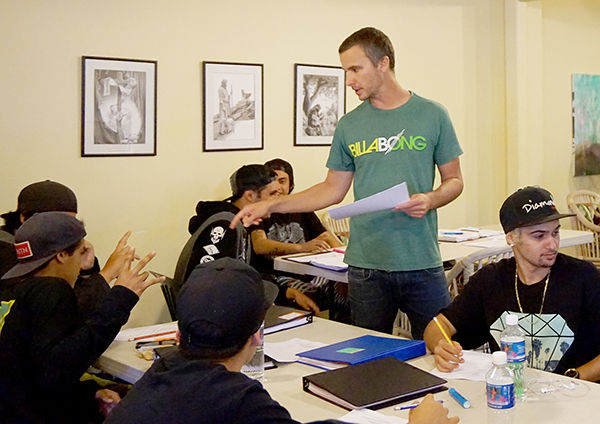LIHUE — As a program coordinator of Hale Kipa, Melinda Montgomery believes in the value of education. So much so, she provides youth with a second chance at learning through the facility’s new Alternative Education Program. Whether helping kids earn
LIHUE — As a program coordinator of Hale Kipa, Melinda Montgomery believes in the value of education.
So much so, she provides youth with a second chance at learning through the facility’s new Alternative Education Program. Whether helping kids earn credits for their GED or helping them look for work, Hale Kipa’s focus is ensuring students avoid falling through the cracks and do their best. The nonprofit works to better the lives for at-risk youth throughout Hawaii.
“We can be there for kids and maximize their potential,” said Montgomery. “In the time I’ve been working here, I’ve seen kids turn around. I see them getting out of trouble and I see them hopeful and I see they’re thriving and that’s exciting.”
For former Kapaa High student Shanna Mei Tolenna, it’s done just that.
“I feel more comfortable because there’s not that much people in this class and it’s just better because I have the help that I need in here rather than a regular school,” Tolenna said outside of classes on Friday. “They help me with my work and they help me by picking me up, going to school, being on time and driving me around to go look for jobs.”
AEP has three educational components to help kids earn their high school diploma or their GED.
The first focuses on credit recovery for kids who wish to graduate with their classes but are lacking credits. Program coordinators collaborate with the students’ school, discover which classes they need and provide online support. The second component allows students to earn their GED through the community schools. In collaboration with the McKinley Adult Community School, which runs the Kauai campus, Hale Kipa allows students to earn their degree online.
The third component of the program is the Competency Based Community School Diploma Program, in which students earn a community school diploma similar to a high school diploma. This degree allows a student to enter any college in Hawaii.
“What I tell all the kids is that when they get that diploma, it’s not the end; it’s the beginning,” said Montgomery. “We really want for them to aspire above the minimum wage (jobs) and the way to do that is education.”
Teachers of the Adult Education Program, which meets at Lihue Missionary Church, 4383 Rice Street, share Montgomery’s philosophy, including Joe Maurer, youth mentor.
“It’s a great organization,” Maurer said. “I believe in what they’re doing and I believe in their method of approaching youth and helping youth. I enjoy being a part of that process.”
Maurer said Hale Kipa works as a team to help students outside of the typical high school classroom.
“It is an avenue for them to build self-confidence and to feel like they have a place where they can learn and take that next step in their lives,” he said.
Richard Cremer, who will be graduating from the alternative education program, also believes in the benefits of Hale Kipa.
“It’s helped me a lot,” Cremer said. “I was in a struggle. I pretty much had no future and they gave me hope to brighten it.”
The adult education pilot program began in June and has enrolled 30 students. It will finish with a graduation ceremony in March.
Hale Kipa has provided services to over 40,000 youth in its 40 years of existence, and continues to care for over 3,000 youth across Oahu, Maui, the Big Island and Kauai.
Hale Kipa’s other programs include foster care, prevention/intervention, residential, emergency shelters, youth outreach and educational/vocational.
Caleb Abergas, another student, said any student who is struggling with school should come to Hale Kipa.
“It helped me become a better person and helped me learn more about education,” said Abergas. “It made me realize that education is really important.”


